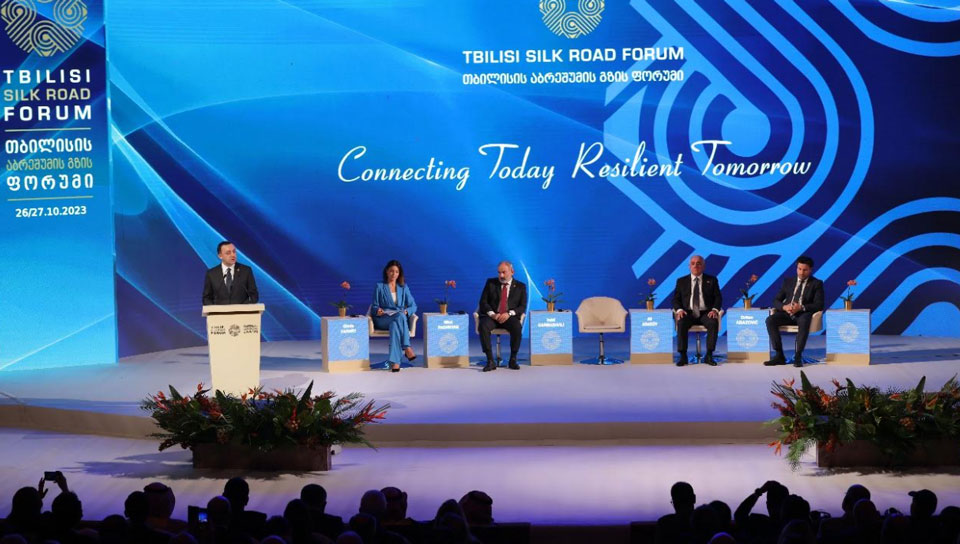Azerbaijan's PM affirms commitment to regional peace, praises Georgia for coordinated regional transport operations
I would like to thank our Georgian friends and, especially, I would like to thank the honourable Prime Minister, Irakli Garibashvili, for such traditional hospitality, which you have shown to me and the delegation of the Republic of Azerbaijan, said the Prime Minister of Azerbaijan, Ali Asadov, in his keynote speech at the opening ceremony of the 4th Tbilisi Silk Road Forum.
As Ali Asadov mentioned, he is glad that he is in the capital of Georgia today. Addressing the opening ceremony, Azerbaijan’s PM emphasized that Azerbaijan and Georgia continue playing the role of a bridge between Europe and Asia in economic and trade relations.
“Azerbaijan and Georgia were among the first countries to support the concept of restoration of the Great Silk Road in the late 1990s. Former President of Georgia Eduard Shevardnadze was the first to join the initiative of National Leader of Azerbaijan Heydar Aliyev to hold an international conference on the restoration of the historic Silk Road and that prestigious conference was held in Baku in 1998 with the participation of the heads of state of 9 countries, 13 international organizations and delegations of 32 countries. Following the conference, the “Basic Multilateral Agreement on International Transport for Development of the Europe-the Caucasus – Asia Corridor” was signed based on the TRACECA Program of the European Union,” Ali Asadov underlined.
Azerbaijan’s PM also highlighted the work done by Azerbaijan for the development of the regional transport corridor.
“The target for the next year is to reduce this period by almost half (11-15 days). This corridor will also become one of the most secure and efficient corridors worldwide. The potential of the Middle Corridor is closely linked to the capacity of ports and railways. In this regard, active work is being done to increase the capacity of Baku International Sea Trade Port, which is one of the largest commercial ports in the Caspian Sea, from 15 million tons to 25 million tons per year. The Georgian ports of Poti and Batumi are also important elements of the Middle Corridor. At the same time, the expansion of Azerbaijan’s Kulevi port, located on the Black Sea coast of Georgia, will also contribute to the Middle Corridor,” the PM underscored.
Ali Asadov added that railways are being modernized in Georgia, ports are being built and expanded, and road infrastructure is being developed. He also pointed out that the new realities in the region create conditions for multilateral cooperation in the region to reach a qualitatively new level, and yield economic and commercial dividends to all regional countries.
The Prime Minister noted that the joint projects of Azerbaijan and Georgia have made an essential contribution to Europe’s energy security.
Prime Minister Ali Asadov expressed his confidence that the discussions and decisions to be made during the forum would contribute to the development of the Great Silk Road and facilitate the expansion of regional cooperation in economic, energy, transport and other areas.
Ali Asadov has also addressed his Armenian counterpart by saying that Azerbaijan expressed its position regarding signing a peace treaty immediately after the 44-day Karabakh war.
“The Prime Minister of the neighbouring country, Armenia, Nikol Pashinyan, raised the issue, and I want to express my attitude towards it.
Azerbaijan enjoys very good economic and trade relations with the countries of the region. I want to tell Nikol Pashinyan that Azerbaijan expressed its position regarding signing a peace treaty immediately after the 44-day Karabakh war. Last month, after the anti-terrorist operation, we expressed the same interest in establishing peace, which will concern, in particular, the field of transport, as per the declaration which was signed on November 9 and 10, 2020. Azerbaijan has worked very hard to present such a position. We want communications to be opened, but it depends not only on us. If the other side wants it, we are ready for it. In other cases, we have enough opportunities,” he said.

